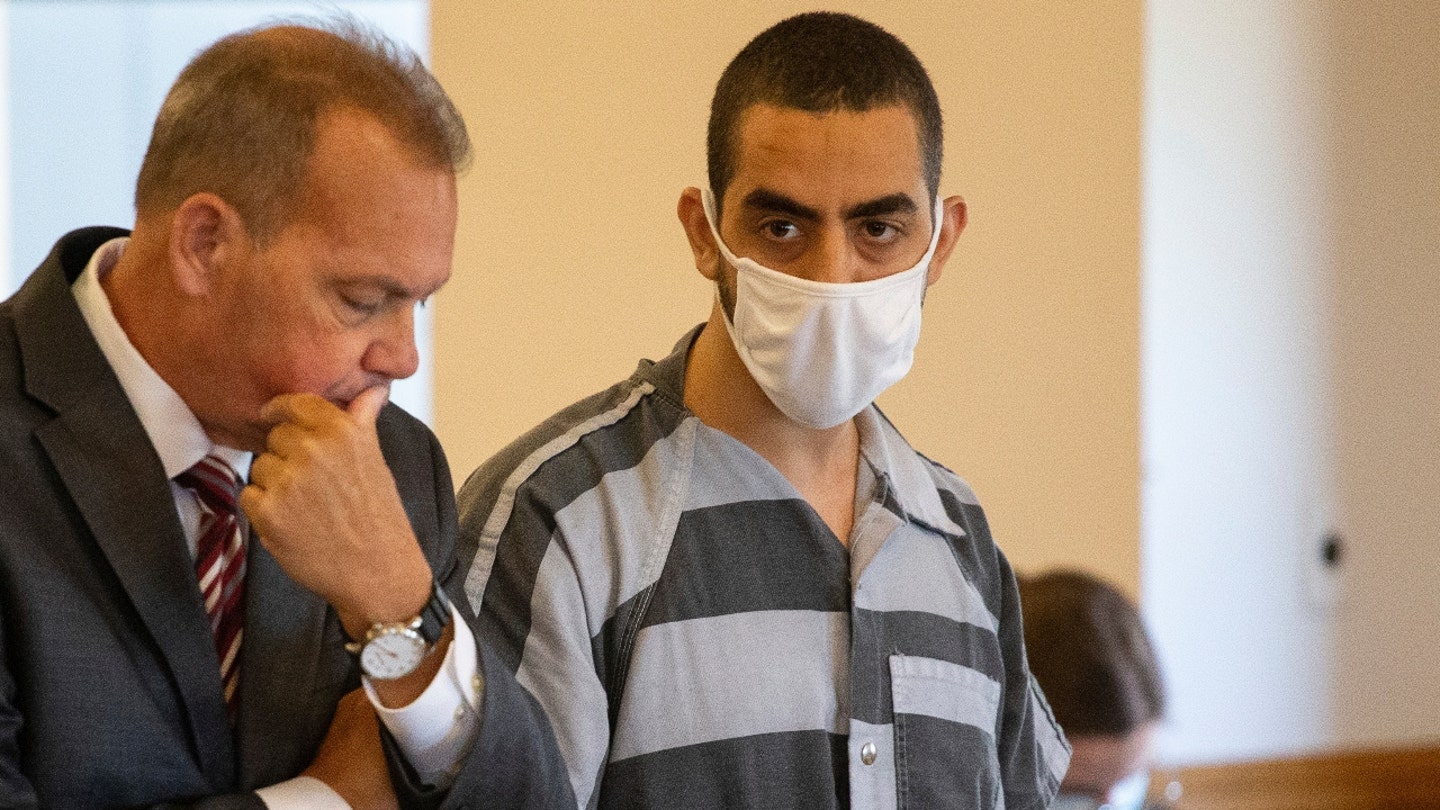
THREAD: israel hezbollah ceasefire can this...
LifeLine™ Media threads use our sophisticated algorithms to construct a thread around any topic you want, providing you with a detailed timeline, analysis, and related articles.

RUSHDIE ATTACKER Charged: Hezbollah Support Sparks Outrage
— Hadi Matar, the man accused of trying to murder Salman Rushdie, now faces charges of supporting Hezbollah. A recent court filing in New York alleges Matar provided “material support” to the terrorist group.
Matar, 26, was charged with stabbing Rushdie on Aug. 12, 2022, at the Chautauqua Institution. Rushdie was airlifted to a hospital and underwent life-saving surgery.
Matar refused a plea deal that required him to plead guilty to a federal terrorism-related charge. Now unsealed in U.S. District Court in Buffalo, he faces additional charges for his alleged ties to Hezbollah.
If convicted on any charges, authorities will confiscate several electronic devices from Matar, including hard drives and cellphones. The indictment highlights the severity of his alleged connections with the Iran-backed terrorist group based in Lebanon.

US-BROKERED CEASEFIRE Stops Deadly India-Pakistan Clashes
— The United States helped end violent fighting between India and Pakistan on May 22, 2025. American officials worked out a ceasefire deal to stop the gunfire along the Line of Control. Both sides agreed to stop all military attacks and try peaceful talks instead.
The U.S. State Department shared news of the agreement in a press release. American diplomats led the effort, showing that the U.S. still plays a big role in keeping peace around the world.
This deal is being called an important step for South Asia. With both countries having nuclear weapons, many hope this truce will lead to more talks and better relations.
To read more, you can visit the official statement on the U.S. State Department’s website.

TRUMP BROKERS Shock Ceasefire: Supreme Court Immigration Bombshell And Deadly Storms Rock America
— Former President Trump says Russia and Ukraine will start immediate ceasefire talks. His push for peace is making headlines and stirring debate. Supporters call it bold leadership, while critics question his motives.
Severe tornadoes have ripped through Kentucky, Missouri, and Virginia. At least 28 people are dead, and many families are now homeless. Survivors are still waiting for federal help as relief teams struggle to reach everyone in need.
The Supreme Court just ended deportation protections for about 350,000 Venezuelans living here. This is a huge change in immigration policy under President Biden.
Other big stories: A Navy cadet ship crashed near the Brooklyn Bridge with deadly results. President Biden was diagnosed with prostate cancer. There was a shooting at a Las Vegas gym and even a cat caught smuggling drugs into a Costa Rica prison. Homeland Security also reported dozens of “self-deportations” on one flight — raising new questions about how immigration laws are enforced.

US CEASEFIRE DEAL Stops Dangerous India-Pakistan Clash
— Quick action from the US, led by Vice President Vance and Secretary Rubio, brought an end to the worst fighting between India and Pakistan in years. Pakistan’s Prime Minister called it a “diplomatic breakthrough.” The new agreement hopes to calm tensions and start real peace talks.
Both countries fired advanced missiles during the conflict. With both sides having nuclear weapons, many feared things could spiral out of control. Washington’s push for peace was key in stopping the violence.

BBC ART Scandal Shocks: Expert Sold to Hezbollah Financier
— A former BBC “Bargain Hunt” art expert has pleaded guilty to selling artwork to a man accused of funding Hezbollah. Oghenochuko Ojiri admitted in a London court that he sold about $185,000 worth of art to Nazem Ahmad between 2020 and 2021.
Nazem Ahmad is banned from doing business in both the U.K. and U.S. because of his alleged ties to terrorism and money laundering for Hezbollah. Prosecutors said Ojiri knew about Ahmad’s background, even talking about his terror links with others before making the sales.
The U.S. Treasury sanctioned Ahmad back in 2019, saying he smuggled blood diamonds and helped finance violence through shady business deals. Even with these warnings, Ojiri still went through with the sales, breaking anti-terrorism laws meant to block money from reaching groups like Hezbollah.

BBC ART Scandal Shocks: Expert Sold to Hezbollah Financier
— A former BBC “Bargain Hunt” art expert has pleaded guilty to selling artwork to a man accused of funding Hezbollah. Oghenochuko Ojiri admitted in a London court that he sold about $185,000 worth of art to Nazem Ahmad between 2020 and 2021.
Nazem Ahmad is banned from doing business in both the U.K. and U.S. because of his alleged ties to terrorism and money laundering for Hezbollah. Prosecutors said Ojiri knew about Ahmad’s background, even talking about his terror links with others before making the sales.
The U.S. Treasury sanctioned Ahmad back in 2019, saying he smuggled blood diamonds and helped finance violence through shady business deals. Even with these warnings, Ojiri still went through with the sales, breaking anti-terrorism laws meant to block money from reaching groups like Hezbollah.

PUTIN’S Easter Ceasefire Shattered: Deadly Betrayal Leaves Ukraine in Mourning
— Three people were killed in Ukraine’s Kherson region during what was supposed to be a 30-hour Easter ceasefire announced by Russian President Vladimir Putin. Ukrainian leaders say Russian forces kept attacking, with President Zelenskyy reporting over 2,900 violations and hundreds of drone strikes during the truce.
Russia denies breaking the agreement. The Russian Defense Ministry claims its troops “strictly observed the ceasefire” and did not push forward. Instead, Moscow accuses Ukraine of nearly 5,000 violations.
Putin says fighting only started again after the truce ended. Meanwhile, Zelenskyy is calling for a longer peace or at least an end to attacks on civilians — something Russia says will only happen if Western countries stop sending weapons to Ukraine.
The back-and-forth blame shows just how little trust remains between Moscow and Kyiv. Both sides point fingers as innocent lives are lost — even on sacred holidays.

PUTIN’S Fake Ceasefire Sparks Outrage As Attacks Rock Ukraine
— Russian President Vladimir Putin announced a 30-hour Easter ceasefire, but deadly attacks still hit the Kherson region. Ukrainian officials say three people were killed and three more hurt during what was supposed to be a truce. The head of Kherson’s administration, Oleksandr Prokudin, shared these numbers with the public.
Ukrainian President Volodymyr Zelenskyy accused Russia of breaking the ceasefire over 2,900 times. He said Russian forces kept up shelling and drone strikes along the front lines. Zelenskyy told his people that “actions always speak louder than words” and promised Ukraine would only stay silent if Russia did too.
Russia’s Defense Ministry pushed back, blaming Ukraine for 4,900 violations instead. They claimed Moscow’s troops “strictly observed the ceasefire.” But as soon as midnight hit and the truce ended, fighting picked right back up across both sides.
Putin says he’ll only agree to a real ceasefire if Western countries stop sending weapons to Kyiv and if Ukraine stops calling up new soldiers — terms Ukraine flatly rejects. With both sides pointing fingers and refusing to budge, this war looks far from over.

PUTIN’S Fake Ceasefire: Ukraine Shattered by Deadly Attacks During “Truce”
— Russian President Vladimir Putin promised a 30-hour EASTER ceasefire. But while he claimed to stop fighting, Ukrainian officials say Russian attacks killed three people in Kherson and injured more. Shelling continued even as Moscow said it was honoring the truce.
Ukrainian President Volodymyr Zelenskyy accused Russia of breaking the ceasefire over 2,900 times. He said there were hundreds of drone strikes and nearly 100 assaults along the front lines during those hours. Zelenskyy made it clear — Ukraine will defend itself if attacked.
Russia’s Defense Ministry pushed back, blaming Ukraine for almost 5,000 violations instead. They insisted Russian troops stayed put and did not attack first. After the truce ended, Putin said fighting resumed and criticized Kyiv for asking Western nations for help instead of peace talks.
Putin now demands that Western countries stop sending weapons to Ukraine before any real ceasefire can happen — something Ukraine refuses to accept. As both sides trade blame over failed truces, peace looks farther away than ever in this brutal war.
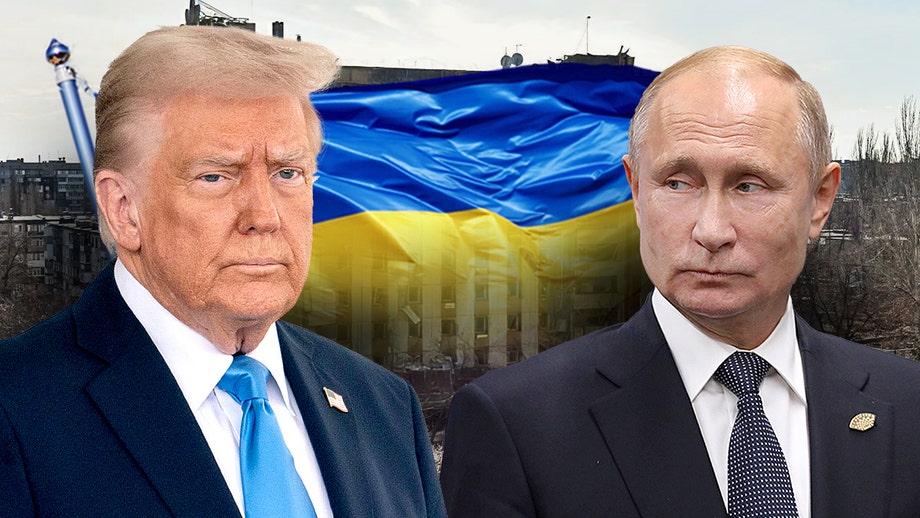
RUSSIA’S CEASEFIRE Bluff: Will They Really Stop the Conflict?
— Secretary of State Marco Rubio announced that RUSSIA’s commitment to a ceasefire in Ukraine will soon be tested. Speaking at NATO headquarters, Rubio stressed the U.S.’s desire to end the conflict and warned against potential delay tactics by Moscow.
Russia’s rejection of a 30-day ceasefire proposed by Ukraine and its conditions for a Black Sea truce have raised doubts about its intentions. The Trump administration remains cautious, with President Trump unwilling to engage in endless talks without concrete actions from Russia.
Rubio avoided detailing Russia’s conditions for peace but pointed out discrepancies between official reports and actual discussions with foreign leaders. This was clear after President Trump’s call with Russian President Putin, where differing accounts emerged about commitments on Black Sea force usage.

TRUMP vs PUTIN: The Dramatic Ukraine Ceasefire Standoff
— An upcoming virtual summit, led by Starmer’s “coalition of the willing,” will discuss military and financial aid for Ukraine. The meeting will also consider a peacekeeping mission if Russia agrees to talks.
About 25 countries, including European partners and Ukraine, plan to join. Notably missing is the United States, which has changed its stance on the war under President Donald Trump after his recent clash with Ukrainian President Zelenskyy in the Oval Office.
The U.S. proposed a 30-day ceasefire in Ukraine, backed by Zelenskyy but met with conditions from Putin. Secretary of State Marco Rubio expressed “cautious optimism” about Putin’s potential agreement after talks with U.S. envoy Steve Witkoff.
Starmer doubts Putin’s intentions and criticizes his delay tactics regarding Trump’s peace plan. He insists that concrete commitments are needed as Putin continues playing “pointless games” with ceasefire proposals, showing little seriousness about achieving peace.
UKRAINE Faces HEARTBREAKING Setback in Russia Conflict
— Ukraine’s recent gains in Russia have sharply declined. Initially, the Ukrainian army captured 500 square miles of Russian land, boosting morale and strengthening their negotiation position. However, the situation has changed drastically.
Under intense pressure from Russian forces, bolstered by North Korean troops, Ukraine now retains only 30% of the territory it initially seized. The rapid retreat from Sudzha highlights the challenges faced by Ukrainian forces.
This shift in control weakens Ukraine’s leverage in potential ceasefire talks with Russia. The loss of this bargaining chip complicates future peace negotiations for Kyiv’s leadership as they navigate ongoing hostilities.

PUTIN’S Conditions for Ukraine Ceasefire Exposed: What He Really Wants
— Russian President Vladimir PUTIN supports a ceasefire in Ukraine, but with strings attached. At a Moscow news conference, he stressed the need to tackle the “root causes” of the conflict.
Putin’s remarks show that while he wants fighting to stop, talks must address deeper issues. This highlights Russia’s focus on its strategic goals in the region.
The peace proposal comes amid ongoing tensions and global calls to end hostilities. Observers say any ceasefire will need careful negotiation and compromise from all sides involved.
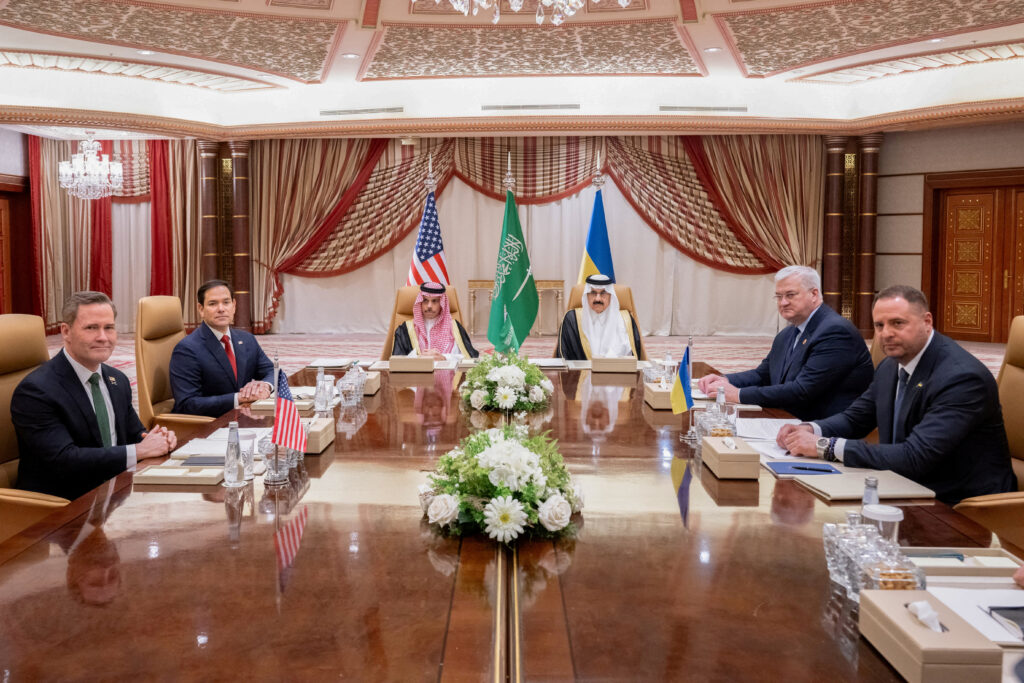
UKRAINE’S Shocking Move: US Ceasefire Plan Accepted
— Ukraine and the United States announced a major development on Tuesday. After discussions in Saudi Arabia, Ukraine agreed to a U.S. proposal for a 30-day ceasefire with Russia. This decision comes as the U.S. resumes military aid and intelligence sharing with Kyiv immediately.
The joint statement from both countries highlights their cooperation amid ongoing tensions with Russia. The ceasefire aims to provide a temporary halt in hostilities, allowing diplomatic efforts to take center stage.
This move is seen as a strategic step by the Biden administration to stabilize the region temporarily while exploring long-term solutions. Critics argue that such measures may only offer short-lived relief without addressing deeper issues in Eastern Europe.

UKRAINE Cease-Fire: Russia’s RESPONSE Could Change Everything
— Russia is waiting for details from Washington on U.S.-Ukrainian cease-fire talks held in Saudi Arabia. Kremlin spokesperson Dmitry Peskov said they need “detailed information” before commenting on the 30-day cease-fire proposal that Ukraine has accepted. Moscow has always opposed temporary measures, wanting a permanent solution to the conflict.
Secretary of State Marco Rubio led the American team in these discussions and confirmed Ukraine’s willingness for a 30-day cease-fire. Rubio assured that the U.S. will inform Russia about the proposal, aiming for immediate talks to end the war permanently.
U.S. envoy Steve Witkoff plans to visit Russia later this week and may meet President Vladimir Putin. “We’re going to bring it to them directly,” Rubio emphasized, showing that Ukraine is ready for negotiations if Russia agrees.
Rubio noted that if Russia accepts, it would be substantial progress toward peace. A refusal would reveal Moscow’s true intentions regarding Ukraine’s ongoing conflict. The outcome could greatly impact future diplomatic relations and regional stability.

UKRAINE CEASEFIRE: US Backs Peaceful Hope In Russia Conflict
— The United States will restart military aid and intelligence sharing with Ukraine. This decision comes after talks in Saudi Arabia, where Kyiv accepted a 30-day ceasefire proposal from the U.S.
This move aims to ease tensions in the ongoing conflict with Russia. The joint statement highlights cooperation between the U.S. and Ukraine to stabilize the region and explore peace options.
The agreement is a crucial step towards potential resolution, though challenges remain as military actions continue in the area. Both nations express hope for a peaceful outcome through this temporary truce.

RUSSIA’S Ceasefire Dilemma: US Negotiations Face Challenges
— Russian President Vladimir Putin is facing hurdles in agreeing to a ceasefire with Ukraine. A senior Russian source says any deal needs detailed terms and guarantees. The United States is actively involved in talks, but Moscow insists that agreements must be on its terms, not Washington’s.
GREENLAND ELECTION SHOCKS WORLD: Trump’s ANNEXATION Threat BACKFIRES
Greenland’s center-right opposition party won a key election influenced by President Donald Trump’s annexation threat. The election showed Greenlanders’ strong desire for independence from Denmark, with 85% opposing US annexation. Recent polls reveal that nearly half of the population sees Trump’s interest as a threat.
TRUMP’S TRADE WARS: Global MARKETS on EDGE
President Trump continues to push tariffs, causing retaliation from the EU and Canada and unsettling global markets. This strategy raises fears of a potential U.S. recession and broader economic slowdown as investor confidence wavers under trade tensions’ pressure.
UKRAINE’S BOLD Move: US-Backed Ceasefire Sparks Hope
— Ukraine has agreed to a U.S.-proposed one-month ceasefire with Russia, if Russia follows the terms. This follows talks with U.S. National Security Advisor Mike Waltz, Secretary of State Marco Rubio, and Saudi Foreign Minister Prince Faisal bin Farhan Al Saud. This is a crucial step amid rising tensions in the region.
The ceasefire proposal shows increased diplomatic efforts by various nations to stabilize Eastern Europe. Saudi Arabia’s involvement highlights its growing role in international peace efforts and may lead to more comprehensive negotiations in the future.
Ukraine’s decision reflects a strategic move towards diplomacy while being cautious about Russia’s commitment to the terms. As global attention turns to this truce, it’s crucial for both sides to adhere strictly for lasting peace prospects.
This development is key for ongoing talks about Ukraine’s conflict with Russia and could lead to stronger diplomatic resolutions if successful. The world watches closely, hoping for peace in this long-standing conflict zone.

US RESTARTS Military AID to Ukraine: A Bold Move Amid Ceasefire Talks
— The UNITED STATES has agreed to restart military aid and intelligence sharing with Ukraine. This decision comes as Kyiv considers a U.S.-proposed 30-day ceasefire with Russia. The announcement marks a pivotal moment in U.S. support for Ukraine amid ongoing conflict.
A joint statement from U.S. and Ukrainian officials confirmed the resumption of security support. The proposed ceasefire aims to reduce hostilities and open doors for further negotiations between the involved parties, signaling a strategic shift in U.S. foreign policy toward stabilizing Ukraine through diplomacy.
This announcement arrives during heightened tensions between Ukraine and Russia, where continued hostilities threaten regional stability. Since the conflict began, the U.S.’s role has been crucial in providing both military and humanitarian assistance to Ukraine, underscoring its commitment to supporting allies against aggression.

US RESUMES MILITARY AID to Ukraine: A Bold Move Amid Ceasefire Talks
— The Trump administration has announced the immediate resumption of military aid to Ukraine. This decision aligns with Ukraine’s openness to a 30-day ceasefire, signaling a potential shift in the ongoing conflict. Delegations from both sides engaged in discussions for several hours, with more talks planned.
President Donald Trump is set to speak with Russian President Vladimir Putin about a possible ceasefire. Ukrainian President Volodymyr Zelensky has been invited back to the White House for further discussions. The Russian Foreign Ministry expressed willingness for continued dialogue with U.S. representatives, sparking hope for a peaceful resolution that respects Ukraine’s sovereignty.
Safety concerns have escalated following a tragic midair collision involving an Army helicopter and an American Airlines jet near Ronald Reagan Washington National Airport in January 2025. All 67 individuals on board both aircraft perished, prompting NTSB investigator Jennifer Homendy to urge the FAA to implement urgent safety measures immediately.
On the economic front, Asian markets are experiencing significant declines amid global sell-off trends impacting investor confidence worldwide. Japan, South Korea, and Taiwan saw market drops of about 2% as part of this broader financial downturn following the S&P 500’s worst day of the year on March 11th.

KURDISH Ceasefire in TURKEY Offers a RAY of Hope
— The Kurdish militant group PKK has declared a ceasefire in its long-standing conflict with Turkey. This decision marks a big change in a 40-year insurgency that has claimed many lives since 1984. The announcement follows the urging for disarmament by the group’s imprisoned leader.
This ceasefire comes after earlier peace talks between the PKK and Ankara fell apart in 2015. The declaration was made through Firat News Agency, linked to the PKK, showing their commitment to peace efforts. This move could open doors for new talks and address old grievances between both parties.
The effects of this ceasefire could be huge for Turkey and the region as a whole. It offers hope amid decades of violence, signaling possible steps toward lasting peace. As tensions ease, chances for constructive dialogue may arise, fostering stability in an area often troubled by conflict.

NETANYAHU’S Bold Warning: Gaza Ceasefire at Risk
— Israeli Prime Minister Benjamin Netanyahu has issued a stern warning. If Israeli hostages are not freed by Saturday, Israel will resume military operations against Hamas. The ceasefire, active since January 19, 2025, is fragile as both sides blame each other for violations. Netanyahu stated the IDF would fight fiercely until Hamas is defeated if demands go unmet.
Hamas reports over 270 ceasefire breaches by Israel, citing attacks that resulted in Palestinian casualties. They have delayed releasing Israeli captives due to these alleged violations and restrictions on humanitarian aid. Hamas leader Sami Abu Zuhri demands both sides honor the ceasefire terms.
President Donald Trump has also commented, urging Israel to abandon the ceasefire if Hamas does not release hostages. He declared that “Let hell break out” should hostages remain captive, adding pressure on Hamas and raising fears of renewed conflict.
The original ceasefire aimed to allow humanitarian aid and enable hostage swaps but remains shaky amid rising tensions. Families of Israeli hostages are protesting in Tel Aviv as uncertainty grows over their loved ones’ fate and peace efforts’ sustainability. Stay tuned for updates as this situation unfolds further.
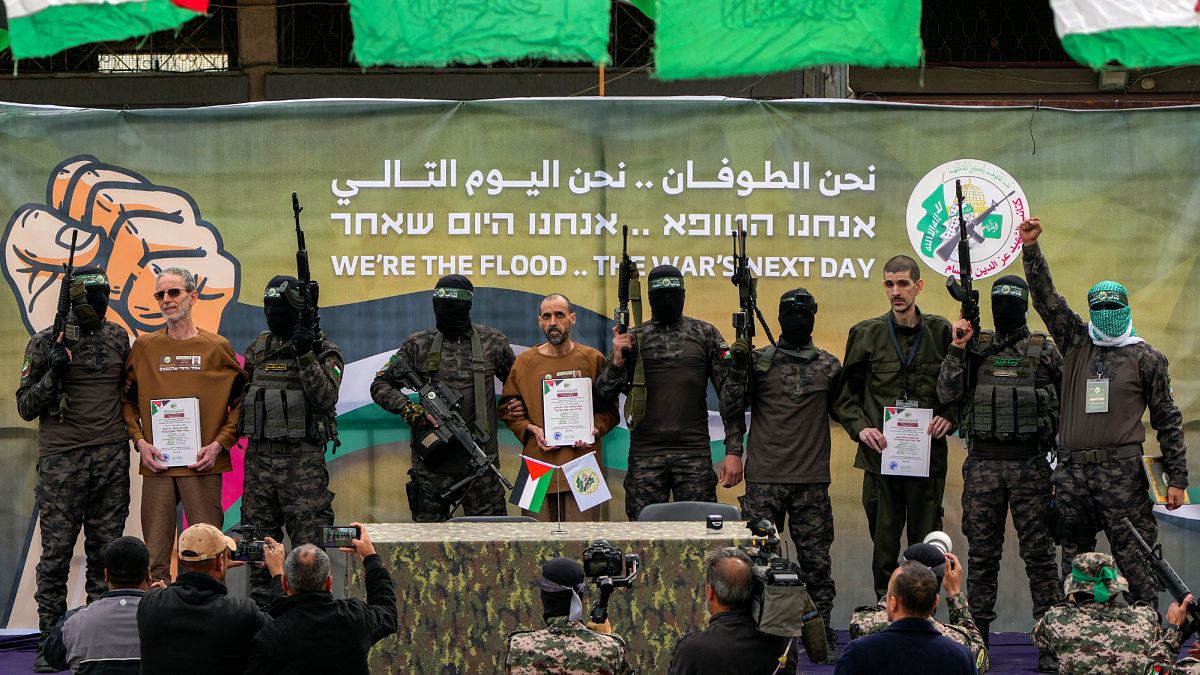
HAMAS HALTS Hostage Release: Ceasefire in Jeopardy
— Hamas has stopped releasing Israeli hostages, accusing Israel of breaking the ceasefire. Israeli officials call this a “violation” and are now on high alert. The ceasefire, active since last month, was seen as a step toward peace talks.
The delay in releasing hostages adds tension to an already shaky situation. Israeli authorities are deeply worried that this could harm ongoing peace efforts. Military forces are on high alert to prevent any possible escalations.
This incident shows the ongoing instability in the Israeli-Palestinian conflict, where ceasefires and hostage issues remain crucial concerns. If not resolved soon, this suspension might affect future talks and regional stability.

LEBANESE REBUILDING Chaos: Families Suffer as Promised Aid Stalls
— Six weeks after the ceasefire between Israel and Hezbollah, Lebanese citizens struggle with slow rebuilding efforts. Many homes in southern and eastern Lebanon were destroyed by Israeli airstrikes. The World Bank estimated infrastructure losses at $3.4 billion before the ceasefire.
Residents near the Lebanon-Israel border remain displaced as Israeli troops have not withdrawn, despite a U.S.-brokered deal requiring their exit by January 26. The Lebanese army is expected to replace Hezbollah forces, but progress is slow due to ongoing Israeli presence.
Reconstruction funding remains uncertain as Hezbollah, once backed by Iran for rebuilding efforts in 2006, faces financial constraints due to Iran’s economic crisis. Although Hezbollah has begun some payments, their capacity is limited compared to past efforts.
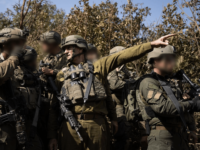
IDF’S POWERFUL Blow: Hezbollah’s Command Shattered in Southern Lebanon
— The IDF Chief of General Staff, LTG Herzi Halevi, recently visited southern Lebanon with key military leaders. He assessed the situation with commanders from various divisions. The focus remains on striking Hezbollah decisively.
Halevi emphasized the significant damage inflicted on Hezbollah’s command structure. “We’ve taken out their entire senior command level,” he stated, noting that around 1,500 Hezbollah operatives have been eliminated. This has reportedly led to a decline in morale among enemy forces.
In a separate operation, the IDF announced the killing of Mahmoud Hamdan (Tom), a Hamas commander previously thought dead. He was responsible for guarding Yahya Sinwar and overseeing hostages in Gaza. His elimination marks another strategic victory for Israel’s defense forces.
Joel B. Pollak of Breitbart News reported these developments while also promoting his books on Trump’s presidency and agenda. Pollak is known for his conservative commentary and analysis across various platforms including Sirius XM Patriot radio show on Sunday evenings.

HEZBOLLAH WEAKENED: Netanyahu’s Strong Message to Lebanon
— Israeli Prime Minister Benjamin Netanyahu announced that Hezbollah’s leadership has faced major losses, including the death of former leader Hassan Nasrallah and his successors. Netanyahu declared, “Today, Hezbollah is weaker than it has been for many, many years,” highlighting Israel’s efforts to reduce the group’s power. He urged the “people of Lebanon” to reclaim their country from Hezbollah’s grip.
Netanyahu accused Iran of turning Lebanon into a pseudo “Iranian military base” serving Tehran’s interests against Israel. He warned that if Lebanon does not act, Hezbollah will continue its aggression from populated areas at Lebanese citizens’ expense. The prime minister encouraged Lebanese citizens to choose peace over conflict stirred by Hezbollah.
While Netanyahu did not specify conditions for stopping Israeli strikes on Hezbollah in Lebanon, there are hints of possible negotiations. Earlier comments by Hezbollah’s deputy leader Naim Qassem suggested openness to a cease-fire excluding Gaza from talks.
The Biden administration reportedly holds “very low” trust in Netanyahu’s government and calls for transparency in these matters. This lack of trust complicates potential negotiations and highlights tensions between the U.S., Israel, and regional actors like Iran and Hezbollah.

HEZBOLLAH WEAKENED: Netanyahu’s Strong Message to Lebanon
— Israeli Prime Minister Benjamin Netanyahu announced that Hezbollah’s leadership has faced major losses, including the death of former leader Hassan Nasrallah and his successors. Netanyahu declared, “Today, Hezbollah is weaker than it has been for many, many years,” highlighting Israel’s efforts to reduce the group’s power. He urged the “people of Lebanon” to reclaim their country from Hezbollah’s grip.
Netanyahu accused Iran of turning Lebanon into a pseudo “Iranian military base” serving Tehran’s interests against Israel. He warned that if Lebanon does not act, Hezbollah will continue its aggression from populated areas at Lebanese citizens’ expense. The prime minister encouraged Lebanese citizens to choose peace over conflict stirred by Hezbollah.
While Netanyahu did not specify conditions for stopping Israeli strikes on Hezbollah in Lebanon, there are hints of possible negotiations. Earlier comments by Hezbollah’s deputy leader Naim Qassem suggested openness to a cease-fire excluding Gaza from talks.
The Biden administration reportedly holds “very low” trust in Netanyahu’s government and calls for transparency in these matters. This lack of trust complicates potential negotiations and highlights tensions between the U.S., Israel, and regional actors like Iran and Hezbollah.

NETANYAHU’S Bold Visit: IDF Heroes Strike Fear Into Hezbollah
— Prime Minister Benjamin Netanyahu made a significant visit to an IDF base on the northern border on October 6, 2024. He met with Maj.-Gen. Ori Gordin and Brig.-Gen. Moran Omer for a security briefing focused on Lebanon and the fight against Hezbollah.
Netanyahu learned about how ground efforts and intense firepower have weakened Hezbollah’s capabilities. He spoke with brigade commanders from the 36th Division about their year-long operations across multiple fronts, showcasing their relentless spirit in combat.
The Prime Minister also addressed soldiers directly, praising their courage and commitment. Netanyahu stressed that IDF troops are dismantling terrorist setups by Hezbollah meant to threaten Israeli communities just meters away from the border.

NETANYAHU’S Bold Visit: IDF Heroes Strike Fear Into Hezbollah
— Prime Minister Benjamin Netanyahu made a significant visit to an IDF base on the northern border on October 6, 2024. He met with Maj.-Gen. Ori Gordin and Brig.-Gen. Moran Omer for a security briefing focused on Lebanon and the fight against Hezbollah.
Netanyahu learned about how ground efforts and intense firepower have weakened Hezbollah’s capabilities. He spoke with brigade commanders from the 36th Division about their year-long operations across multiple fronts, showcasing their relentless spirit in combat.
The Prime Minister also addressed soldiers directly, praising their courage and commitment. Netanyahu stressed that IDF troops are dismantling terrorist setups by Hezbollah meant to threaten Israeli communities just meters away from the border.

IDF STRIKES Hezbollah: Major Airstrikes Rock Lebanon
— On Saturday, the Israel Defense Forces (IDF) launched major airstrikes against Hezbollah in southern Lebanon. The IDF targeted 400 sites, including rocket launchers ready for activation.
The IDF reported hitting about 290 targets with thousands of launcher barrels and other terrorist infrastructure. Later in the day, another series of strikes hit around 110 Hezbollah targets.
Hezbollah responded by firing at Israeli communities in the north. Between 6:24 and 7:00 AM, about 85 projectiles crossed into Israeli territory. Some were intercepted while others caused fires in Kiryat Bialik, Moreshet, and other areas.
Later sirens sounded again as approximately 20 more projectiles were identified crossing from Lebanon into Israel’s Jezreel Valley area. Most were intercepted or fell in open areas without causing injuries. The IDF remains committed to dismantling Hezbollah’s capabilities.

NETANYAHU VOWS Swift Justice After Hezbollah Attack Kills Children
— The Israeli response to Hezbollah’s rocket attack in Lebanon is imminent after the group targeted a children’s soccer field, killing 12 young people. Early Monday, Israel Defense Forces (IDF) reportedly executed a drone strike in southern Lebanon, resulting in the deaths of two Hezbollah terrorists. The IDF has not commented on the strike.
Prime Minister Benjamin Netanyahu held a three-hour cabinet meeting on Sunday, authorizing him and his defense minister to determine the “manner and timing” of a military response. Danny Danon, Israel’s new ambassador to the United Nations, told “Fox and Friends” that Israel’s response will be “swift, harsh and painful,” but clarified there are no intentions for a full war.
Netanyahu visited Majdal Shams on Monday and announced that Israel’s response to the massacre “will come and it will be severe.” He expressed solidarity with the Druze Israeli community, emphasizing their shared grief. U.S. Secretary of State Antony J. Blinken spoke with Israeli President Isaac Herzog about the situation on Monday as well.

NETANYAHU VOWS Swift Justice After Hezbollah Attack Kills Children
— The Israeli response to Hezbollah’s rocket attack in Lebanon is imminent after the group targeted a children’s soccer field, killing 12 young people. Early Monday, Israel Defense Forces (IDF) reportedly executed a drone strike in southern Lebanon, resulting in the deaths of two Hezbollah terrorists. The IDF has not commented on the strike.
Prime Minister Benjamin Netanyahu held a three-hour cabinet meeting on Sunday, authorizing him and his defense minister to determine the “manner and timing” of a military response. Danny Danon, Israel’s new ambassador to the United Nations, told “Fox and Friends” that Israel’s response will be “swift, harsh and painful,” but clarified there are no intentions for a full war.
Netanyahu visited Majdal Shams on Monday and announced that Israel’s response to the massacre “will come and it will be severe.” He expressed solidarity with the Druze Israeli community, emphasizing their shared grief. U.S. Secretary of State Antony J. Blinken spoke with Israeli President Isaac Herzog about the situation on Monday as well.

RUSHDIE ATTACKER Charged: Hezbollah Support Sparks Outrage
— Hadi Matar, the man accused of trying to murder Salman Rushdie, now faces charges of supporting Hezbollah. A recent court filing in New York alleges Matar provided “material support” to the terrorist group.
Matar, 26, was charged with stabbing Rushdie on Aug. 12, 2022, at the Chautauqua Institution. Rushdie was airlifted to a hospital and underwent life-saving surgery.
Matar refused a plea deal that required him to plead guilty to a federal terrorism-related charge. Now unsealed in U.S. District Court in Buffalo, he faces additional charges for his alleged ties to Hezbollah.
If convicted on any charges, authorities will confiscate several electronic devices from Matar, including hard drives and cellphones. The indictment highlights the severity of his alleged connections with the Iran-backed terrorist group based in Lebanon.


Social Chatter
What the World is Saying